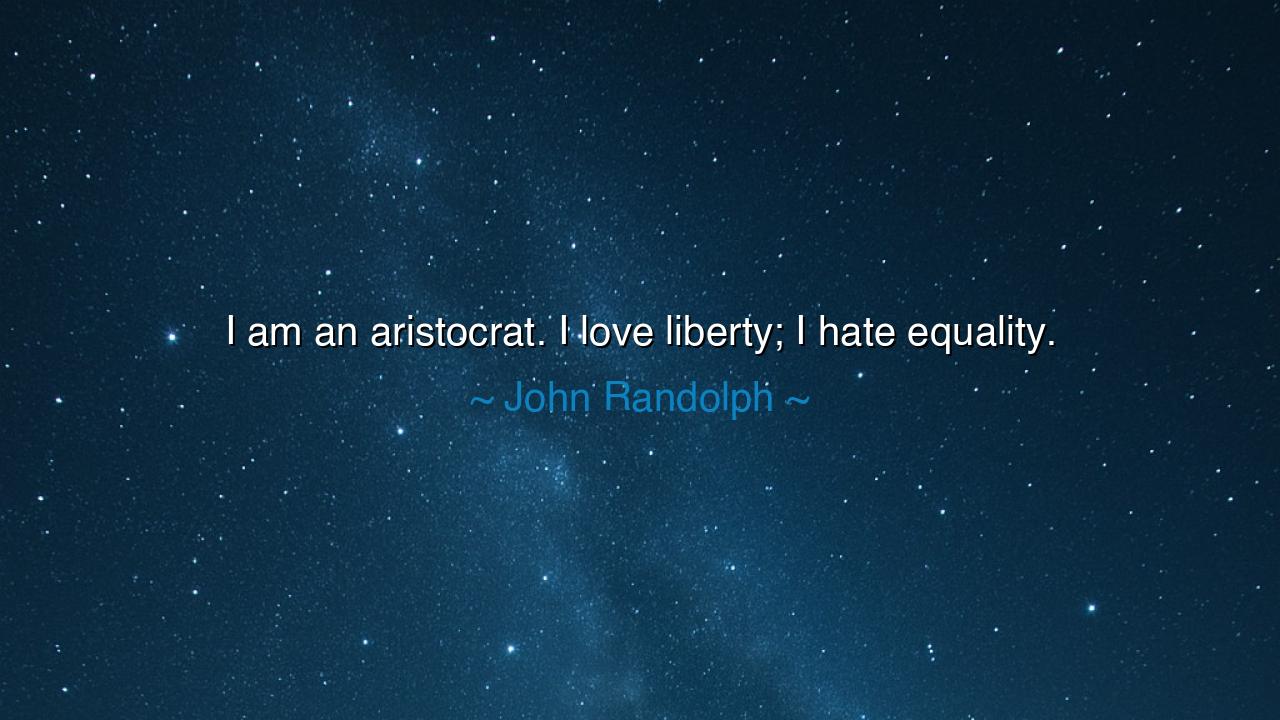
I am an aristocrat. I love liberty; I hate equality.






When John Randolph proclaimed, “I am an aristocrat. I love liberty; I hate equality,” he spoke as a man of paradox — one who cherished freedom but feared the leveling hand of revolution. These words, fierce and unsettling, echo from an age when nations trembled between the ancient order of rank and the newborn ideal of universal rights. Randolph, a Virginian orator of the early 19th century, lived at a time when liberty and equality were wrestled over not only in parliaments but in the very soul of civilization. His declaration was not born from malice alone, but from the belief — mistaken or not — that freedom thrives only when greatness is allowed to rise above the crowd.
In the style of the ancients, we may say Randolph spoke as one of the old patricians of Rome, wary of the mob. To him, liberty was the sacred right of the strong — the reward of courage, intellect, and virtue — not the inheritance of every man regardless of merit. When he said he “hated equality,” it was not equality before God he despised, but the idea that all men should share alike in station and influence. He feared that in the pursuit of sameness, society would crush excellence, and that in trying to make every man equal, it would make all men small. Such a view, though proud, reflects a timeless tension: can a world that prizes liberty truly embrace equality without destroying what makes individuals distinct?
The origin of this quote lies in Randolph’s fiery defense of the old aristocratic order of Virginia — a society built on inherited wealth and tradition. He was a man of contradictions: eloquent yet reckless, noble in spirit yet enslaved to pride. He saw the French Revolution and its aftermath — the guillotine, the blood-soaked streets — and took from it a single lesson: that the cry of “equality” can become a weapon against freedom itself. In his eyes, liberty required structure, hierarchy, and reverence for what is tested by time. Equality, to him, was chaos — a force that leveled wisdom and folly alike, dissolving the natural bonds that guided society.
History offers us many such voices, men who feared that democracy, if unrestrained, would consume its own virtues. Plato, too, in his Republic, warned that unbridled equality breeds anarchy, and that when every man believes himself fit to rule, order dissolves into tyranny. And yet, others — like Thomas Jefferson, Randolph’s own kinsman — believed that liberty and equality are not enemies, but twins born of justice. Between these visions, humanity has always struggled: one seeking to preserve the heights of excellence, the other yearning to lift all from the depths of oppression.
To understand Randolph is to glimpse an ancient truth — that liberty without compassion can harden into arrogance, while equality without restraint can descend into envy. Both must be balanced by wisdom. Liberty, when rightly loved, cherishes the dignity of individual soul; equality, when rightly understood, guards against the corruption of pride. Randolph’s words remind us of what happens when one is exalted and the other despised — freedom turns cruel, and justice loses her sight.
Consider the lesson of ancient Sparta, where liberty was the privilege of warriors and equality was confined to those of noble birth. The city endured for centuries — disciplined, proud, and strong — yet it perished when its rigid order could no longer adapt. Contrast it with Athens, where freedom of speech and equality of voice gave birth to art, philosophy, and democracy itself. Athens fell, too — but its spirit endured in the hearts of humankind. From this we learn that though the aristocrat may defend liberty, it is equality that ensures its soul survives.
Thus, the teaching of this quote is not to accept Randolph’s hatred, but to heed his warning. Equality, when misunderstood as sameness, can indeed destroy freedom’s flame; but liberty, when confined to the few, becomes tyranny in noble disguise. The wise man must love both rightly — to honor the worth of each soul while preserving the space for greatness to rise. True equality does not mean that all men are alike, but that each has the right to become his fullest self beneath the same sun of freedom.
And so, let this truth be passed down: liberty without equality becomes domination, and equality without liberty becomes despair. The task of every generation is to keep these forces in sacred balance — to raise up the weak without chaining the strong, to build a society where excellence and fairness walk hand in hand. For only then can humanity rise beyond the fear of one and the hatred of the other, and find the harmony that neither John Randolph nor his age could yet see — the unity of freedom that dignifies all.






AAdministratorAdministrator
Welcome, honored guests. Please leave a comment, we will respond soon